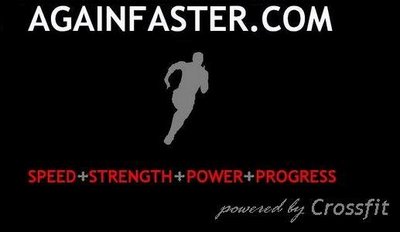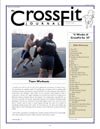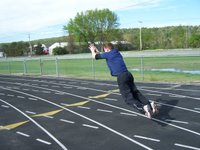Advanced Medicine

Crossfit hurts. Almost every day someone approaches me pre-workout, complaining of pain, silently hoping for relief in the form of less weight or reduced volume.
Most of the time, I give it to them. We’re not in the business of destroying bodies. If an athlete has the experience to differentiate between muscle soreness and pain, I’ll always defer to their judgment.
The plaintive wailings are always accompanied by requests for advice. My standard answer: take a day off, spend it on the foam roller, stay hydrated, and come back later.
For better or worse, some athletes are absolutely incapable of accepting this advice. They want to train. Blasting through workouts is like breathing for these folks—my words go in one ear and out the other. They’re going to work out eight days a week, whether I say so or not.
When this urge competes with pain, the most obvious answer is pills. Ibuprofen, acetaminophen, and naproxen sodium are packed away like candy at Christmas, and our little superhero shows up for Crossfit, bouncing around like an ADD-ridden toddler.
Unfortunately, my pill-popping uber-athlete is killing his athletic development.
NSAIDs (non-steroidal anti-inflammatory drugs) reduce post-workout protein synthesis, impairing your ability to develop muscle mass and severely limiting the beneficial effects of resistance exercise.
The proof is easy to come by:
A 1982 experiment showed that prescription-strength doses of NSAIDs reduce protein synthesis in-vitro. This interesting but inconclusive Petri dish project was substantiated in 2001, when an in-vivo study found that post-workout protein synthesis increased 76% in the absence of NSAIDs, while it did not increase at all in the presence of NSAIDs.*
A 2003 study in the Journal of Strength and Conditioning Research gives us another reason to decry the pills, as if killing protein synthesis wasn’t enough.
Using 19 freshman guys, a bottle of Advil, and a leg curl machine, researchers at Democritus University of Thrace found that ibuprofen reduced the perception of delayed-onset muscle soreness but did nothing to restore muscle function. The subjects couldn’t produce more force under the influence of ibuprofen, despite the fact that they felt recovered.
Super. Where do I sign up?
Because this argument clearly needs more support, let’s talk about most insidious consequence of chronic pain reliever use. NSAIDs blunt your pain response, preventing you from knowing when soreness turns into injury. This exposes you to the possibility of endless bouts of painful rehabilitation, trading daily training sessions for visits to the physical therapist.
On balance, pain relievers hinder athletic development and increase your chance of injury. They may allow you to train more often, but they won’t allow you to train smarter.
Save the Advil for your hangovers.
Go faster!
*This summary was paraphrased from Pinnacle Fitness. You can find the original article here. Picture courtesy of cancerworld.org.

Crossfit hurts. Almost every day someone approaches me pre-workout, complaining of pain, silently hoping for relief in the form of less weight or reduced volume.
Most of the time, I give it to them. We’re not in the business of destroying bodies. If an athlete has the experience to differentiate between muscle soreness and pain, I’ll always defer to their judgment.
The plaintive wailings are always accompanied by requests for advice. My standard answer: take a day off, spend it on the foam roller, stay hydrated, and come back later.
For better or worse, some athletes are absolutely incapable of accepting this advice. They want to train. Blasting through workouts is like breathing for these folks—my words go in one ear and out the other. They’re going to work out eight days a week, whether I say so or not.
When this urge competes with pain, the most obvious answer is pills. Ibuprofen, acetaminophen, and naproxen sodium are packed away like candy at Christmas, and our little superhero shows up for Crossfit, bouncing around like an ADD-ridden toddler.
Unfortunately, my pill-popping uber-athlete is killing his athletic development.
NSAIDs (non-steroidal anti-inflammatory drugs) reduce post-workout protein synthesis, impairing your ability to develop muscle mass and severely limiting the beneficial effects of resistance exercise.
The proof is easy to come by:
A 1982 experiment showed that prescription-strength doses of NSAIDs reduce protein synthesis in-vitro. This interesting but inconclusive Petri dish project was substantiated in 2001, when an in-vivo study found that post-workout protein synthesis increased 76% in the absence of NSAIDs, while it did not increase at all in the presence of NSAIDs.*
A 2003 study in the Journal of Strength and Conditioning Research gives us another reason to decry the pills, as if killing protein synthesis wasn’t enough.
Using 19 freshman guys, a bottle of Advil, and a leg curl machine, researchers at Democritus University of Thrace found that ibuprofen reduced the perception of delayed-onset muscle soreness but did nothing to restore muscle function. The subjects couldn’t produce more force under the influence of ibuprofen, despite the fact that they felt recovered.
Super. Where do I sign up?
Because this argument clearly needs more support, let’s talk about most insidious consequence of chronic pain reliever use. NSAIDs blunt your pain response, preventing you from knowing when soreness turns into injury. This exposes you to the possibility of endless bouts of painful rehabilitation, trading daily training sessions for visits to the physical therapist.
On balance, pain relievers hinder athletic development and increase your chance of injury. They may allow you to train more often, but they won’t allow you to train smarter.
Save the Advil for your hangovers.
Go faster!
*This summary was paraphrased from Pinnacle Fitness. You can find the original article here. Picture courtesy of cancerworld.org.




















3 Comments:
Amen.
I've never liked the use of any type of drug, although that probably explains why this is my 11th day having a cold.
Besides, soreness is part of the fun.
Great post Jon but you forgot to mention the benefits of massage...much better then the foam roller.
I actually trained a high school senior who trained with a guy before me, that told him to pop 3 advil before each session regardless of any pain!!
Dawn
um i guess i should stop taking 2 advil for my back before coming to xfit. shit. no wonder im not extremely buff right now.
Post a Comment
<< Home